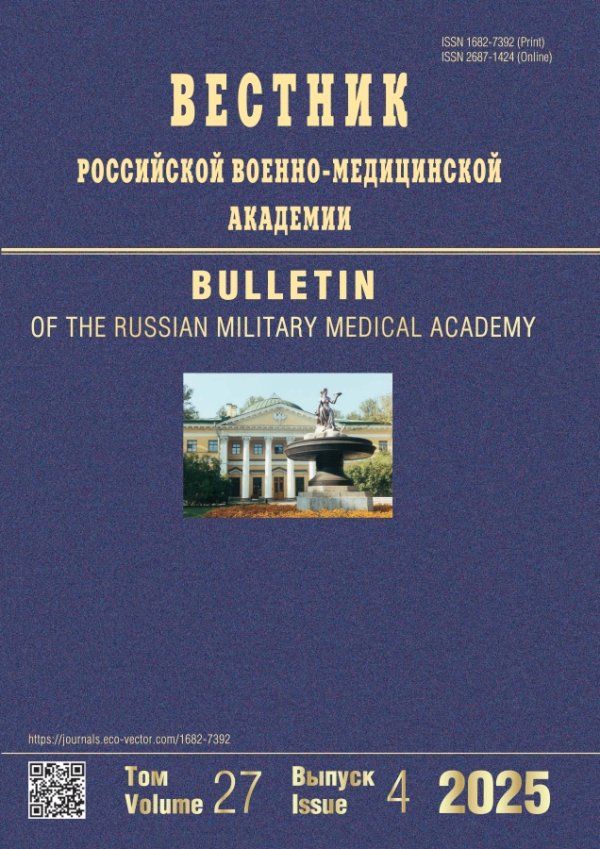Approaches to the justification of targeted subsidies for drugs in providing medical care in ambulatory conditions in military medical organizations
- Authors: Miroshnichenko Y.V.1, Shcherba M.P.1, Merkulov A.V.1
-
Affiliations:
- Military Medical Academy named after S.M. Kirov Ministry of Defense of the Russian Federation
- Issue: Vol 23, No 3 (2021)
- Pages: 177-188
- Section: Public Health
- URL: https://ogarev-online.ru/1682-7392/article/view/71353
- DOI: https://doi.org/10.17816/brmma71353
- ID: 71353
Cite item
Abstract
This study presents the results of the analysis of the funding mechanisms for drug supply of assigned contingents in the provision of outpatient medical care in military medical organizations. Existing approaches to determining methods for optimizing the need for drugs are considered. In addition, this paper presented approaches to the formation of a formulary list of medicinal products of a military medical organization. This study also showed the possibility of using pharmacoeconomic assessment in justifying targeted subsidies for drug supply. The relevance of the analysis of the assortment structure for entry into the approved list of vital and essential medicines is emphasized. A possible algorithm for substantiating a targeted subsidy for drug supply in the provision of outpatient medical care within the framework of military health care involved eight stages. First, the incidence of attached contingents entitled to drug supply at the expense of the Russian Ministry of Defense for outpatient treatment was analyzed. Second, the nomenclature of medicines was determined by comparing the incidence pattern of attached contingents with the list of medicines presented in the standards of medical care and clinical recommendations. Third, groups of drugs (with specific and wide spectrum of action) normally used are distinguished, considering the uniqueness of consumption when predicting (planning) demand. Fourth, the need for medicines were formulated using the normative method, modeling method, and logicoeconomic and other methods for determining the need, taking into account the peculiarities of their application in medical, social, and economic conditions of the military medical organization. Fifth, the created drug list was optimized based on the combined ABC-VEN analysis. Sixth, the formal list of the military medical organization was optimized by taking into account the results of pharmacoeconomic research on the treatment of specific diseases. Seventh, an analysis of the assortment structure in relation to the list of vital and essential drugs was performed to further substantiate their economic, clinical, and pharmacoeconomic effectiveness. Eighth, a targeted subsidy for drug supply was calculated, and application was filed, which contained calculations of planned costs with the appendix of the list of planned drugs for purchase, as well as commercial proposals justifying its cost.
Full Text
##article.viewOnOriginalSite##About the authors
Yuri V. Miroshnichenko
Military Medical Academy named after S.M. Kirov Ministry of Defense of the Russian Federation
Email: miryv61@gmail.com
SPIN-code: 9723-1148
doctor of pharmaceutical sciences, professor
Russian Federation, Saint PetersburgMaria P. Shcherba
Military Medical Academy named after S.M. Kirov Ministry of Defense of the Russian Federation
Author for correspondence.
Email: marya.scherba@yandex.ru
SPIN-code: 9840-4740
candidate of pharmaceutical sciences, associate professor
Russian Federation, Saint PetersburgAndrey V. Merkulov
Military Medical Academy named after S.M. Kirov Ministry of Defense of the Russian Federation
Email: prowizzor@yandex.ru
SPIN-code: 1514-9910
candidate of pharmaceutical sciences
Russian Federation, Saint PetersburgReferences
- Fisun AYa, Miroshnichenko YuV, Shcherba MP, Golubenko RA. Assessment of the prospects for introducing drug insurance into military healthcare as part of project activities. Bulletin of the Russian Military Medical Academy. 2020;(2):125–133. (In Russ.).
- Miroshnichenko YuV, Bunin SA, Goryachev AB, Golubenko RA. Lekarstvennoye obespecheniye v voyennom zdravookhranenii Rossii: metodologiya i praktika. Saint Petersburg: Izd-vo Politekhnicheskogo un-ta; 2016. (In Russ.).
- Mnushko ZN, Dikhtyareva NM. Menedzhment i marketing v farmatsii. Chast’ 2. Marketing v farmatsii. 2nd ed. Khar’kov: Izd-vo NFaU: Zolotyye stranitsy; 2008. (In Russ.).
- Mishchenko MA. Teoreticheskiye osnovy farmatsevticheskogo marketinga. Metody opredeleniya potrebnosti i sprosa na lekarstvennyye sredstva. Bulletin of medical internet conferences. 2014;4(8):1005–1017. (In Russ.).
- Aleksandrov GA. Zakupka lekarstvennykh preparatov: instruktsiya po primeneniyu. Moscow: Uchebnyy tsentr PROGOSZAKAZ.RF; 2018. (In Russ.).
- Yagudina RI, Serpik VG, Kulikov AYu. Pharmacoeconomics for the health care managers: decisionmaking algorithm based on pharmacoeconomic assessments. Pharmacoeconomics: Theory and Practice. 2014;2(1):5–20. (In Russ.). doi: 10.30809/phe.1.2014.47
- Garrido MV, Kristensen FB, Nielsen CP, Busse R. Health Technology Assessment and Health Policy-Making in Europe: Current Status, Challenges, and Potential. European Observatory for Health Systems and Policies. Copenhagen: WHO Regional Office for Europe, 2008. Available from: https://www.euro.who.int/__data/assets/pdf_file/0003/90426/E91922.pdf
- Miroshnichenko YuV, Shcherba MP, Golubenko RA, Merkulov AV. Justification of possible forms of organization of assessment of medical technologies in the conditions of military health care. Pharmacoeconomics: Theory and Practice. 2019;7(1):60. (In Russ.) doi: 10.30809/phe.1.2019.33
- Miroshnichenko YuV, Shcherba MP, Kostenko NL, et al. Justification of possible forms of organization of assessment of medical technologies in the conditions of military health care. Pharmacoeconomics: Theory and Practice. 2019;7(1):59. (In Russ.). doi: 10.30809/phe.1.2019.32
- Yagudina RI, Kulikov AYu, Serpik VG, Kostina EO. Comparative analysis of the methodology of pharmacoeconomic assessment according to the original (dated 08.28.2014) and the current (dated 10.29.2018) version of the government decree of the Russian Federation N871. Pharmacoeconomics: Theory and Practice. 2019;7(1):7–16. (In Russ.) doi: 10.30809/phe.1.2019.53
- Blinov DV, Akarachkova ES, Orlova AS, et al. New framework for the development of clinical guidelines in Russia. Modern Pharmacoeconomic and Pharmacoepidemiology. 2019; 12(2): 125–144. (In Russ.). doi: 10.17749/2070-4909.2019.12.2.125-144
Supplementary files










